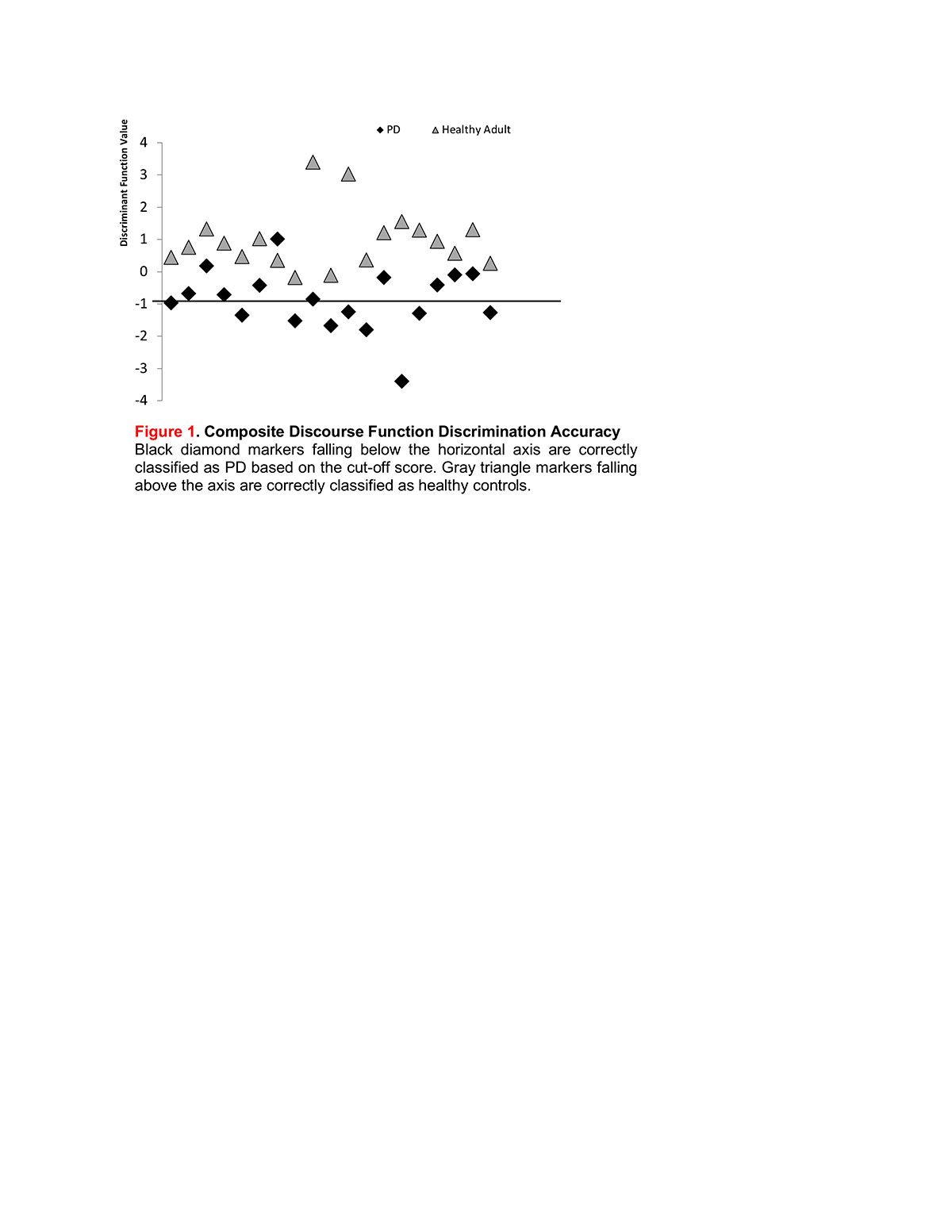Session Information
Date: Wednesday, September 25, 2019
Session Title: Cognition and Cognitive Disorders
Session Time: 1:15pm-2:45pm
Location: Agora 3 East, Level 3
Objective: To Investigate the differences in spoken language profiles of individuals with Parkinson’s disease (PD) compared to healthy controls (HC).
Background: In the absence of neuropsychological findings, early cognitive changes associated with dementia can be detected in spoken language [1]. Spoken language impairments including grammar errors, information content/efficiency, coherence, and verbal disfluencies emerge in PD, even in early disease [2-6]. Thus, a spoken language biomarker may be a valuable supplement to extant neuropsychological evaluation for monitoring cognitive-linguistic changes in real world environments. To this end, understanding comprehensive spoken language profiles of individuals with PD without dementia is foundational.
Method: Spontaneous language samples from 19 PD participants (M-age = 70.74, M-UPDRS-III = 30.26) and 19 healthy controls (M-age = 68.16) were collected using two parallel forms of a standardized picture description task [7]. The two groups did not differ on standardized measures of speech intelligibility and speech rate. Dementia was ruled-out using the MDS Level I criteria, neuropsychological testing, and the Dementia Rating Scale-2. Using standardized approaches, we conducted a multi-level discourse analysis evaluating spoken language productivity, grammar/syntax, information content, fluency, and lexical diversity [8]. Using multivariate approaches (MANOVA and discriminant function analysis), we generated a function that optimally classified spoken language samples generated by individuals with PD and HC.
Results: Syntax complexity, lexical diversity, and total words did not differ between groups and were not included in the final algorithm. An optimally weighted, spoken discourse function comprised of % Correct Information Units (%CIUs), CIUs/minute, % grammatical utterances, words/minute, and % verbal disruptions categorized discourse samples with 82% sensitivity and 87% specificity.
Conclusion: Results confirm that changes in spoken language occur early in PD, underscoring the multidimensional nature of communication impairments in this population. The sensitivity/specificity results suggest that spoken discourse is a potential target for further testing as a behavioral biomarker of cognitive impairment in PD.
References: 1. Mueller, K., Koscik, R., Turkstra, L., Riedeman, S., LaRue, A…Johnson, S. (2016). Connected language in late middle-aged adults at risk for Alzheimer’s disease. Journal of Alzheimer’s Disease,54(4):1539-550. 2. Roberts A. and *Post, D. (2018). Information content and efficiency in Parkinson’s disease spoken discourse. Journal of Speech, Language, and Hearing Research, 61, 2259-2274. 3. Roberts A, Orange JB. Discourse in Lewy Body Spectrum Disorder. (2013) In: Davis B, Guendouzi J, editors. Pragmatics in Dementia Discourse. Newcastle upon Tyne: Cambridge Scholars Publishing; pp. 147-204. 4. Ash S, Xie SX, Gross RG, Dreyfuss M, Boller A, Camp E, Morgan B, O’shea J, Grossman M. The organization and anatomy of narrative comprehension and expression in lewy body spectrum disorders. Neuropsychology. 2012;26:368-384. 5. Ash, S., Jester, C., York, C., Kofman, O., Langey, R…Grossman, M. (2017). Longitudinal decline in speech production in Parkinson’s disease spectrum disorders. Brain and Language, 171: 42-51. 6. Murray, L.L. and Lenz, L.P. (2001). Productive syntax abilities in Huntington’s and Parkinson’s diseases. Brain and Cognition, 46(1-2): 213-219. 7. Nicholas, L. E., & Brookshire, R. H. (1993). A system for quantifying the informativeness and efficiency of the connected speech of adults with aphasia. Journal of Speech and Hearing Research, 36(2), 338-350. 8. Sheratt, S. (2007). Multi-level discourse analysis: A feasible approach. Aphasiology, 21 (3-4): 375-393.
To cite this abstract in AMA style:
A. Roberts. Spoken Language Profiles in Parkinson’s Disease: A Potential ‘Biomarker’ of Cognitive Change? [abstract]. Mov Disord. 2019; 34 (suppl 2). https://www.mdsabstracts.org/abstract/spoken-language-profiles-in-parkinsons-disease-a-potential-biomarker-of-cognitive-change/. Accessed April 22, 2025.« Back to 2019 International Congress
MDS Abstracts - https://www.mdsabstracts.org/abstract/spoken-language-profiles-in-parkinsons-disease-a-potential-biomarker-of-cognitive-change/

